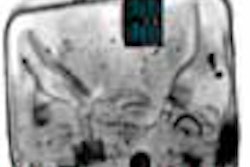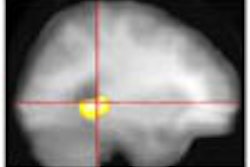Doctors faced with performing MR studies on squirming children have found fair success in dosing the children with melatonin to induce sleep. Researchers at Birmingham Children's Hospital, U.K., gave 50 "uncooperative" children a 10-mg dose of melatonin prior to imaging. They presented the results of their study at the 2001 RSNA meeting in Chicago last week.
"Usually with young children who are undergoing MRI we use sedation," said Dr. Karl Johnson, a consultant pediatric radiologist at the hospital. "But the sedation of children undergoing MRI examination carried a risk of decreased oxygen saturation and of the child drifting into a deeper level of unconsciousness." In addition, Johnson said that when general anesthesia is used in these patients, it requires more staff to monitor the patient.
The 50 patients in Johnson's study included 11 children under the age of four; 16 children with developmental delay; 14 children with behavioral disturbances; five children who had involuntary movements; three autistic patients; and one with trisomy (Down syndrome).
In the study, 34 of the 50 children went to sleep about 45 minutes after receiving their melatonin, which was mixed into a drink. Johnson said 30 of the patients were transferred to the MRI suite and underwent a successful examination. Two children thrashed about in their sleep and did not have a complete study. Their parents later confirmed that the children often moved while sleeping, Johnson said.
Johnson and colleagues also conducted a trial to see what would happen if the children were sleep-deprived before receiving the melatonin. Of the 25 children who were kept up later, awakened earlier than usual, and kept awake during the drive to the hospital, 72% went to sleep and had successful MR exams.
"None of the children required a hospital, oxygen saturation monitoring, or close nursing supervision," Johnson said. When the examinations were completed, a gentle shake woke the children. He reported no side effects among children who were given melatonin.
Dr. Donald Frush, associate professor of radiology at Duke University School of Medicine in Durham, NC, commented that this was the first time he’d heard of melatonin being used for an MR exam.
While Frush called it a "reasonable application," he said it was unlikely a medical center such as Duke would embrace the melatonin method. Most large facilities have the staff necessary to monitor children under general anesthesia. Johnson concurred, but added that melatonin might make sense for a small clinic in an outlying area that did not have the required manpower.
By Edward SusmanAuntMinnie.com contributing writer
December 10, 2001
Related Reading
Senna granules clear the way for better barium enemas, July 2, 2001
Blueberry juice enhances pediatric MR urography, April 26, 2001
Tracking of pediatric sedation for MR imaging highlights concerns, July 11, 2000
Studies reiterate the value and quality of ultrafast CT and MRI for pediatric patients, May 8, 2000
Copyright © 2001 AuntMinnie.com




















